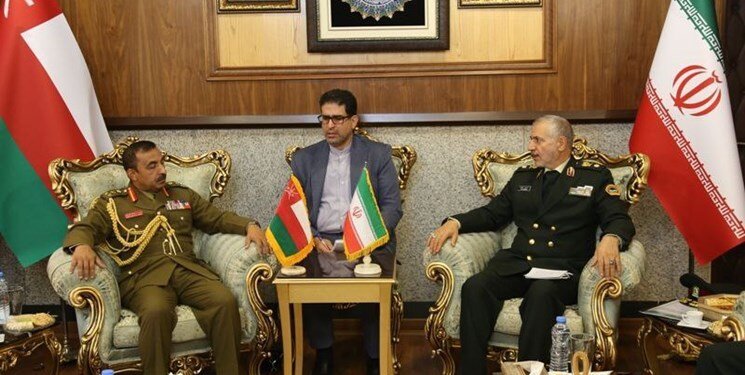Oman ready to co-op with Iran to combat drug trafficking

TEHRAN –Oman is willing to collaborate with the Islamic Republic of Iran to deal with drug and human trafficking, and other maritime crimes as well.
Brigadier General Hamed bin Abdullah bin Ahmed Al Balushi, the deputy chief of staff of Oman's Armed Forces, made the remarks in a meeting with Brigadier General Ahmad-Ali Goudarzi, commander of Iran's Border Guards, in Tehran on Wednesday, IRNA reported.
The Omani official went on to say that drug traffickers are a big concern for all countries. The police and the Coast Guard of Oman have maintained an active presence in the regional waters, working ceaselessly to prevent drug trafficking. Oman also appreciates Iran’s efforts in the fight against drug trafficking.
Drug trafficking is often undertaken through international waters, which must be dealt with immediately, he added.
Voicing his country’s readiness to cooperate with Iran, Al Balushi stated Oman is ready to take any joint action with the Islamic Republic of Iran to fight drug and human trafficking as well as other maritime crimes.
Goudarzi, for his part, said the border cooperation between Iran and Oman has been always desirable.
Emphasizing the need for more interaction between the border guards of the two countries, he added: “Many countries in the world owe a debt to the Islamic Republic of Iran for the fight against drug trafficking.”
Iran has some 8,755 kilometers of shared border with 15 neighboring countries, which has caused problems for the country.
Goudarzi highlighted favorable border interaction between the two countries has resulted in the least occurrence of border crimes.
The Persian Gulf and the Oman Sea are important for the countries of the region in terms of security. Thus, Iran will fight hard against drug traffickers and will prevent them from entering the region, he stated.
Iran in cooperation with neighboring countries can provide security in joint waterways and deal with drug trafficking and terrorism at sea, he added.
Goudarzi stressed that holding joint naval drills by Iran, Pakistan, and Oman will ensure the common security of the sea borders.
Border cooperation will lead to border coordination, and the exchange of information. It will also ensure border security and lead to more successful tackling of drug and human trafficking and maritime crimes than ever before, he concluded.
Regional, global cooperation
In a meeting in Tehran with Rear Admiral Imtiaz Ali, the director general of the Pakistan Maritime Security Agency, on November 21, Goudarzi said the security of the Persian Gulf and the Oman Sea is of great importance to the regional countries.
He added that more than four thousand people have been martyred and some 12 thousand wounded in the fight against drug smuggling.
He went on to say that so far Iran has discovered more than 500 tons of narcotics in the current Iranian calendar year (started March 21). Over 15 tons of narcotic drugs have been discovered in the Sea of Oman.
To prevent drug trafficking, and illegal fishing, and ensure the safety of fishermen in the sea, the control of the sea borders should be enhanced by the two countries; joint patrols and maneuvers should be held, too, Goudarzi said.
Imtiaz Ali, for his part, said, "Fortunately, the sea borders of the two countries are calm and this is the result of coordination and understanding between the two countries.
Emphasizing the need to increase cooperation toward the management of sea borders, he said the Persian Gulf is of vital importance to the world that needs security. “So, we must secure stability in the region so that people can have a better life.”
Drug trafficking constitutes an important problem for Pakistan. “Our country is strongly against it and strictly deals with those engaged in drug smuggling,” he added.
On October 8, Iran anti-narcotics police chief, Iraj Kakavand, in a meeting with the United Nations Office on Drugs and Crime (UNODC) representative in Tehran, Alexander Fedulov, called it essential to support Iran in the fight against drug trafficking
During the meeting, Fedulov said the Islamic Republic of Iran has always been committed to a serious and decisive fight against narcotics at the regional and global level, IRIB reported.
Iran has spent a huge sum of money fighting the war on drugs, and apart from that, many anti-narcotics forces have sacrificed their lives in this way. The high number of martyrs and injured shows Iran's serious determination to deal with this scourge, the UN official added.
"Considering the fact that the Islamic Republic of Iran is at the forefront of the fight against drug trafficking, the UNODC and the international community support of Iran should be proportionate to the activities and actions at the regional and global level.”
He stated since new smuggling routes and concealment methods are emerging, it is necessary for the anti-narcotics police to be equipped with new detection equipment and tools. Needless to say, the UNODC in Tehran plays a prominent role in providing some of these tools.
Kakavand, for his part, highlighted the need to promote regional cooperation and said, “The Anti-Narcotics Police of Iran has always announced its readiness to collaborate and improve cooperation with all the countries in the region and the world to eradicate narcotics.”
Holding meetings with the anti-narcotics police of Pakistan and Afghanistan in the form of a tripartite initiative in previous years is a strong proof of this claim, he noted.
MT/MG
Leave a Comment